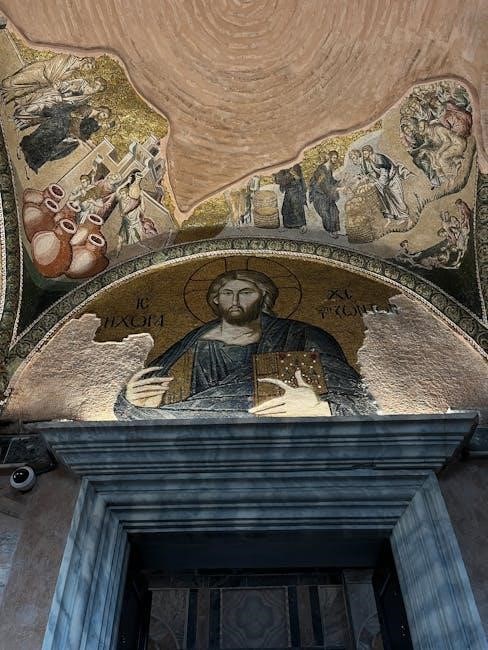The number 40 holds profound symbolic meaning in the Bible, representing periods of testing, trial, and judgment. It signifies a generation or epoch, often marking divine transitions and spiritual transformation across both Old and New Testament narratives.
1.1 Symbolism and Relevance

The number 40 in the Bible is deeply symbolic, often representing periods of testing, preparation, and transformation. It signifies a generation or epoch, marking divine transitions and spiritual growth. This number is frequently associated with judgment, trial, and the accomplishment of God’s purpose. In both the Old and New Testaments, 40 appears in events like Noah’s flood (40 days), Moses’ wilderness journey (40 years), and Jesus’ temptation (40 days). These instances highlight its role as a round number symbolizing completeness and readiness for new beginnings. The recurrence of 40 underscores its relevance in biblical narratives, connecting human history to divine plans and emphasizing spiritual renewal.
1.2 Overview of Key Events Associated with 40
The number 40 is linked to numerous significant events in the Bible. Noah’s flood lasted 40 days and nights, symbolizing divine judgment and renewal. Moses spent 40 years in Egypt, 40 years in the Sinai wilderness, and then led Israel for 40 years, marking his transformative journey. The Israelites wandered the wilderness for 40 years as a period of purification. Elijah traveled 40 days and nights to Mount Horeb, emphasizing spiritual preparation; David and Gideon each ruled for 40 years, signifying a generation of leadership. In the New Testament, Jesus fasted for 40 days in the wilderness, mirroring Old Testament patterns of testing and divine purpose. These events highlight the recurring theme of 40 as a time of preparation, trial, and fulfillment.

The Symbolic Meaning of 40
The number 40 symbolizes testing, trial, and judgment, often representing a generation or epoch. It signifies transformation, preparation, and divine purpose, leading to spiritual growth and renewal.
2.1 Period of Testing and Trial
The number 40 frequently signifies a period of testing and trial in the Bible. It represents a time of refinement, where individuals or groups face challenges to prove their faith and resilience. For instance, Noah endured 40 days and nights of rain, demonstrating unwavering trust in God. Moses spent 40 years in Egypt and the Sinai, preparing for his divine mission. Similarly, Jesus fasted for 40 days in the wilderness, resisting temptation and solidifying His purpose. This pattern underscores the idea that testing is a precursor to divine appointment, ensuring spiritual readiness for greater responsibilities. The recurrence of 40 emphasizes its role as a transformative period, shaping individuals for God’s purpose.
2.2 Representation of a Generation or Epoch
The number 40 in the Bible often symbolizes a generation or a specific epoch in history. It represents a defined period during which significant events unfold, marking the completion of one phase and the beginning of another. For example, Moses spent 40 years in Egypt, 40 years in the Sinai, and then 40 years leading the Israelites, each phase signifying a distinct generation or era. Similarly, the Israelites wandered in the wilderness for 40 years, representing a generation that transitioned from slavery to freedom. This pattern emphasizes that 40 is not just a number but a marker of divine timing, signifying the end of one cycle and the start of another, often tied to transformation and fulfillment of God’s purpose.
2.3 Completion and Accomplishment of God’s Purpose
The number 40 in the Bible also signifies the completion and accomplishment of God’s purpose. It often marks the end of a trial or testing period, leading to the fulfillment of divine plans. For instance, Noah’s flood lasted 40 days and nights, after which God established a new covenant with humanity. Similarly, the Israelites spent 40 years in the wilderness, preparing them to enter the Promised Land, marking the completion of their journey. Even Jesus fasted for 40 days in the wilderness, symbolizing the completion of His preparation before beginning His ministry. This pattern underscores how 40 represents not only testing but also the fulfillment of God’s plan, leading to new beginnings and spiritual renewal.

Old Testament Examples of the Number 40
The number 40 appears frequently in the Old Testament, marking significant events like Noah’s flood, Moses’ time in Egypt and Sinai, the Israelites’ wilderness journey, and Elijah’s 40-day trek, symbolizing divine purpose and transformation.
3.1 Noah’s Flood: 40 Days and Nights
The flood of Noah is one of the most iconic examples of the number 40 in the Bible. Genesis describes how rain fell for 40 days and 40 nights, symbolizing a period of divine judgment and purification. This event marked a significant transition, as it cleansed the earth of corruption and paved the way for a new beginning. The duration of 40 emphasized God’s patience and the completion of His purpose, as the floodwaters receded, revealing a fresh start for humanity. This narrative underscores the dual nature of 40 as both a time of trial and a precursor to renewal, aligning with its broader symbolic meaning in Scripture.
3.2 Moses: 40 Years in Egypt, 40 Years in the Sinai
Moses’ life is deeply intertwined with the number 40, reflecting its symbolic significance. He spent the first 40 years in Egypt, where he was raised in luxury but ultimately fled after committing a crime. This period symbolized preparation and divine shaping. Following this, Moses spent another 40 years in the Sinai desert, tending sheep, a time of humility and alignment with God’s plan. Finally, he led the Israelites for 40 years in the wilderness, marking a generation’s transition and testing. These three phases of 40 years each represent periods of testing, transformation, and fulfillment of God’s purpose, aligning with the biblical theme of 40 as a period of trial and divine preparation.
3.3 The Israelites: 40 Years in the Wilderness
The Israelites’ 40 years in the wilderness is a pivotal example of the symbolic significance of the number 40 in the Bible. This period was a direct consequence of their disobedience and lack of faith in God’s promise of the Promised Land. The wilderness journey served as a time of testing and purification, during which the original generation that had known slavery in Egypt died, and a new generation prepared to enter Canaan. This 40-year period symbolizes both judgment for unbelief and God’s patience, allowing time for transformation and readiness to fulfill His covenant promises. It underscores the theme of 40 as a time of trial, preparation, and transition, aligning with the broader biblical narrative of divine purpose and redemption.
3.4 Elijah: 40 Days and Nights of Journey
Elijah’s 40 days and nights of journey is a significant biblical event that underscores the symbolic importance of the number 40. Following his confrontation with the prophets of Baal on Mount Carmel, Elijah fled into the wilderness, escaping Queen Jezebel’s wrath. During this period, he traveled to Mount Horeb, where he encountered God in a still, small voice—a profound moment of divine communication. This journey symbolizes a time of testing and spiritual preparation, aligning with the broader biblical theme of 40 representing periods of trial and transformation. Elijah’s experience mirrors other biblical accounts, such as Jesus’s 40 days in the wilderness, emphasizing the number’s role in marking completion and readiness for divine purpose.
3.5 David and Gideon: 40 Years of Leadership
The number 40 is also associated with leadership in the Bible, as seen in the lives of David and Gideon. Both leaders served for 40 years, symbolizing a complete generation or epoch. David, Israel’s second king, ruled for 40 years, establishing Jerusalem as the capital and strengthening the monarchy. Similarly, Gideon, a judge of Israel, led the nation for 40 years, bringing peace and prosperity after defeating the Midianites. Their leadership periods emphasize the biblical theme of 40 as a number representing a full cycle or divine appointment, marking significant transformations and the fulfillment of God’s purpose in their lives and the nation’s history. This pattern underscores the symbolic importance of 40 in leadership and national renewal.

New Testament Examples of the Number 40
The number 40 appears in the New Testament through Jesus’ 40-day wilderness journey, symbolizing a period of testing and preparation before His ministry, mirroring Old Testament patterns of divine purpose.
4.1 Jesus: 40 Days in the Wilderness
The number 40 is prominently featured in the New Testament through Jesus’ 40-day journey in the wilderness. This period, documented in Matthew 4:1-2 and Luke 4:1-2, symbolizes a time of intense testing and spiritual preparation. Jesus fasted during this time, enduring temptation from Satan, which paralleled Israel’s 40-year wilderness experience. This act of humility and obedience marked His readiness to embark on His divine ministry. The 40-day period also mirrored Old Testament events, such as Moses’ 40-day stay on Mount Sinai and Elijah’s 40-day journey to Mount Horeb, emphasizing a pattern of divine testing and transformation. Through this, Jesus demonstrated spiritual resilience and alignment with God’s purpose, setting the stage for His redemptive mission. This event underscores the significance of 40 as a period of preparation and transition in biblical narratives.

Spiritual Significance of the Number 40
The number 40 symbolizes spiritual preparation, transition, and transformation, often leading to new life and growth. It represents a period of divine testing, culminating in fulfillment of God’s purpose.
5.1 Preparation and Transition
The number 40 in the Bible often signifies periods of preparation and transition, marking the journey from one phase of life or mission to another. Moses spent 40 years in the wilderness before leading Israel out of Egypt, while Elijah traveled 40 days to Mount Horeb for divine encounters. Similarly, Jesus fasted for 40 days in the wilderness, preparing for His ministry. These instances highlight 40 as a time of spiritual refinement, equipping individuals for their divine purpose. Such transitions often involve separation from the worldly, allowing individuals to focus on spiritual growth and alignment with God’s will. This pattern underscores the importance of preparation in fulfilling one’s calling and mission.
5.2 New Life, Growth, and Transformation
The number 40 in the Bible symbolizes new life, growth, and transformation. Noah’s flood, lasting 40 days, brought renewal to the earth, while the Israelites’ 40-year wilderness journey culminated in a new generation prepared to enter the Promised Land. Moses’ 40-year sojourn in Midian transformed him into a leader, and Elijah’s 40-day journey to Horeb marked a turning point in his ministry. Even Jesus’ 40-day fast in the wilderness symbolized His preparation for a new phase of ministry. These examples illustrate how 40 signifies spiritual and physical renewal, often marking the end of one chapter and the beginning of another, filled with purpose and divine destiny. This theme underscores the transformative power of perseverance and faith in God’s plan.
The number 40 in the Bible symbolizes transformation, divine purpose, and spiritual growth, marking periods of testing and renewal that lead to fulfillment of God’s plan.

6.1 Summary of the Significance
The number 40 in the Bible is a recurring motif symbolizing periods of testing, transformation, and the completion of divine purposes. It often represents a generation or an epoch, marking significant transitions in biblical history. From Noah’s flood to the Israelites’ wilderness journey, and from Moses’ leadership to Jesus’ temptation, 40 embodies spiritual preparation and renewal. This number underscores God’s patience and the process of sanctification, highlighting themes of judgment, trial, and ultimate redemption. Its consistent use across both the Old and New Testaments reinforces its profound spiritual significance in understanding God’s plan and human destiny.
6.2 Relevance in Modern Christian Teachings
The number 40 remains a powerful symbol in modern Christian teachings, often used to emphasize spiritual preparation and transformation. Many churches incorporate 40-day programs, such as Lent, to mirror biblical patterns of fasting and reflection. The concept of 40 as a period of trial and testing encourages believers to endure challenges with faith, trusting in God’s plan. It also underscores the idea of community and shared journey, as seen in the Israelites’ wilderness experience. Modern teachings highlight how 40 represents completion and new beginnings, inspiring believers to seek personal growth and alignment with divine purpose. This timeless symbolism continues to enrich Christian devotion and understanding of spiritual journeys.

